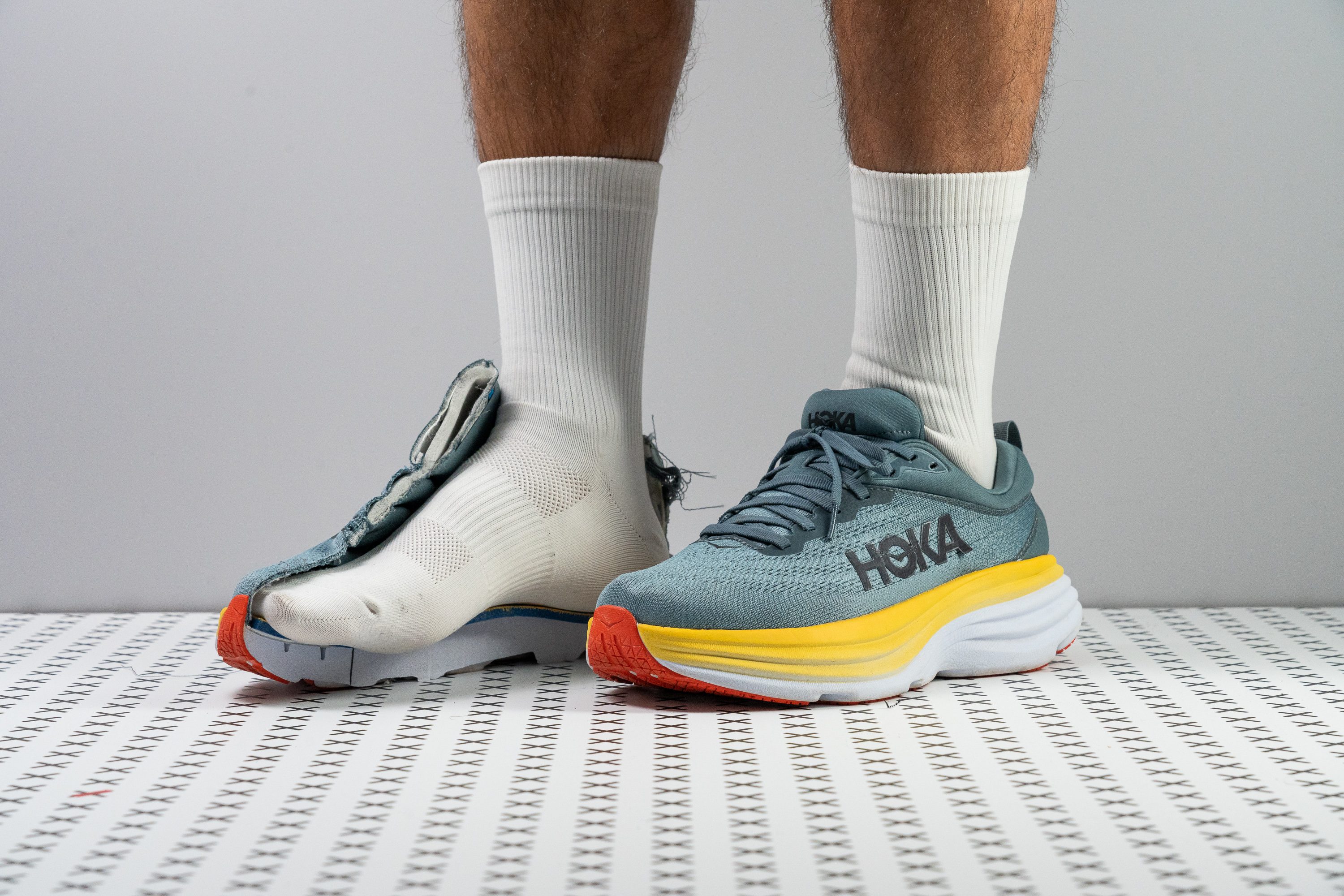Our verdict
Pros
- Oozing with comfort
- Gliding ride
- Feels stable
- Breathable
- Upper is soft as hell
- Highly durable
Cons
- Tight midfoot
- Narrow toebox
- It's still heavy
- Lacks energy return
Audience verdict
- Top 3% most popular running shoes
Comparison
The most similar running shoes compared
+ + Add a shoe | |||||
|---|---|---|---|---|---|
| Audience score | 84 Good! | 89 Great! | 89 Great! | 91 Superb! | |
| Price | $165 | $170 | $130 | $180 | |
| Pace | Daily running | Daily running | Daily running | Daily running | |
| Shock absorption | Moderate | High | Moderate | High | |
| Energy return | Low | Moderate | Moderate | Moderate | |
| Traction | - | High | Moderate | High | |
| Arch support | Neutral | Neutral | Neutral | Neutral | |
| Weight lab Weight brand | 11 oz / 311g 11 oz / 311g | 10.7 oz / 303g 10.5 oz / 297g | 10.1 oz / 285g 9.8 oz / 277g | 10.3 oz / 291g 10.3 oz / 292g | |
| Drop lab Drop brand | 6.2 mm 4.0 mm | 9.1 mm 5.0 mm | 7.0 mm 6.0 mm | 9.6 mm 8.0 mm | |
| Strike pattern | Mid/forefoot | HeelMid/forefoot | HeelMid/forefoot | HeelMid/forefoot | |
| Size | True to size | True to size | True to size | True to size | |
| Midsole softness | Soft | Balanced | Balanced | Soft | |
| Difference in midsole softness in cold | Big | Small | Normal | Big | |
| Toebox durability | - | Good | Decent | Decent | |
| Heel padding durability | - | Good | Decent | Decent | |
| Outsole durability | - | Good | Bad | Decent | |
| Breathability | Moderate | Moderate | Moderate | Moderate | |
| Width / fit | Narrow | Medium | Medium | Medium | |
| Toebox width | Narrow | Medium | Medium | Medium | |
| Stiffness | Stiff | Moderate | Moderate | Stiff | |
| Torsional rigidity | Stiff | Stiff | Moderate | Stiff | |
| Heel counter stiffness | Moderate | Moderate | Moderate | Moderate | |
| Rocker | ✓ | ✓ | ✓ | ✓ | |
| Heel lab Heel brand | 36.2 mm 39.0 mm | 41.3 mm 43.0 mm | 36.8 mm 31.0 mm | 42.9 mm 47.0 mm | |
| Forefoot lab Forefoot brand | 30.0 mm 35.0 mm | 32.2 mm 38.0 mm | 29.8 mm 25.0 mm | 33.3 mm 39.0 mm | |
| Widths available | NormalWide | NarrowNormalWideX-Wide | Normal | Normal | |
| Orthotic friendly | ✓ | ✓ | ✓ | ✓ | |
| Season | All seasons | All seasons | All seasons | All seasons | |
| Removable insole | ✓ | ✓ | ✓ | ✓ | |
| Ranking | #478 Bottom 30% | #85 Top 23% | #96 Top 25% | #31 Top 9% | |
| Popularity | #15 Top 3% | #1 Top 1% | #235 Bottom 38% | #159 Top 42% |
Who should buy
We are convinced that the Bondi 8 from Hoka is a daily running shoe that's great for those who want a very cushioned ride. It is a Godsend for recovery runs.
And if you want a shoe that can also double for walking, this version of the Hoka Bondi won't let you down.
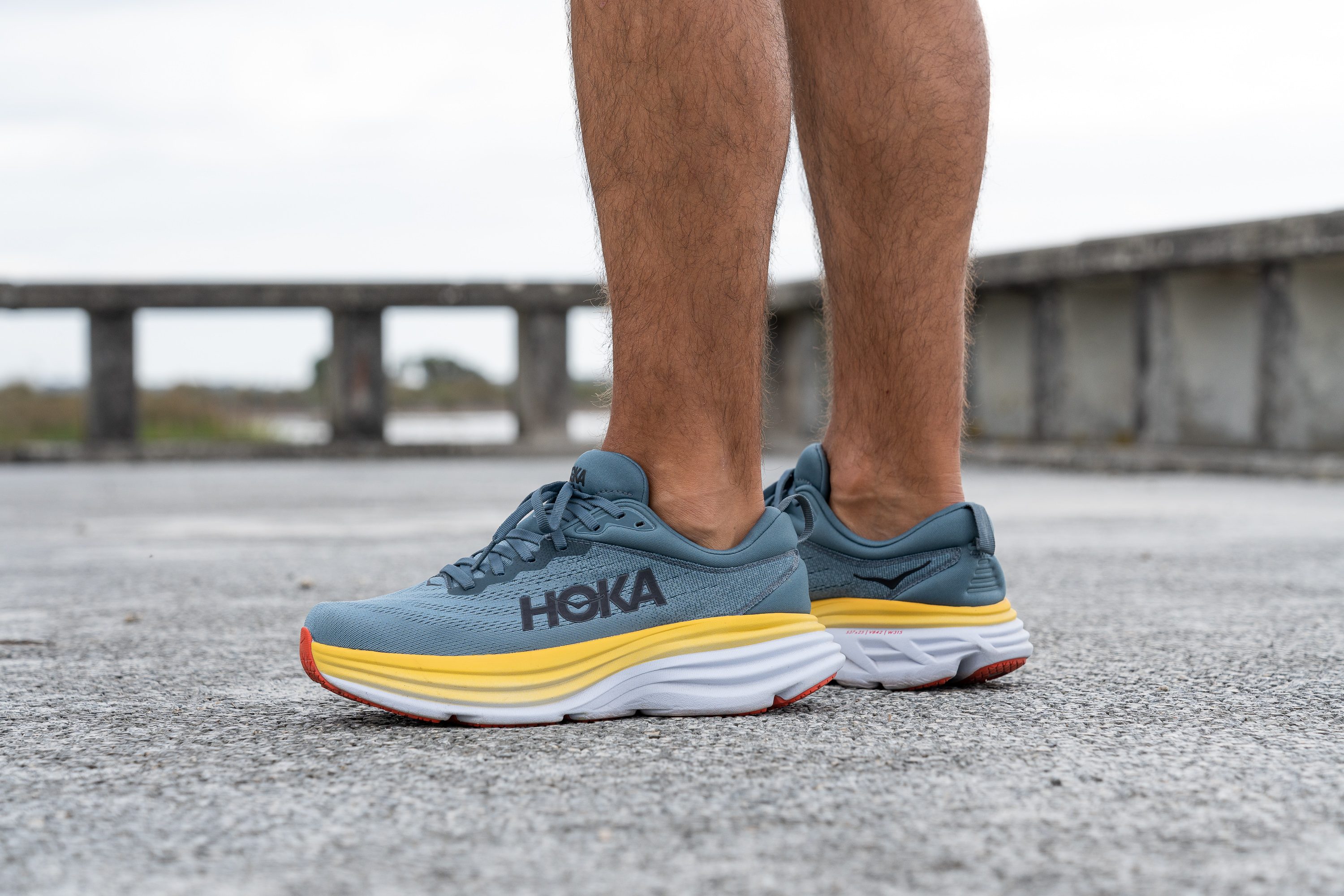
Who should NOT buy
The Hoka Bondi 8 is a pass if you want a running shoe that gives a lightweight ride. If this is the case, you can opt for the Hoka Clifton 9 instead. It weighs about 2 oz less than the Bondi 8.
If you have wider feet, you might find the shoe's midfoot too tight. We think that the Saucony Triumph 21 would be a better fit in your case.
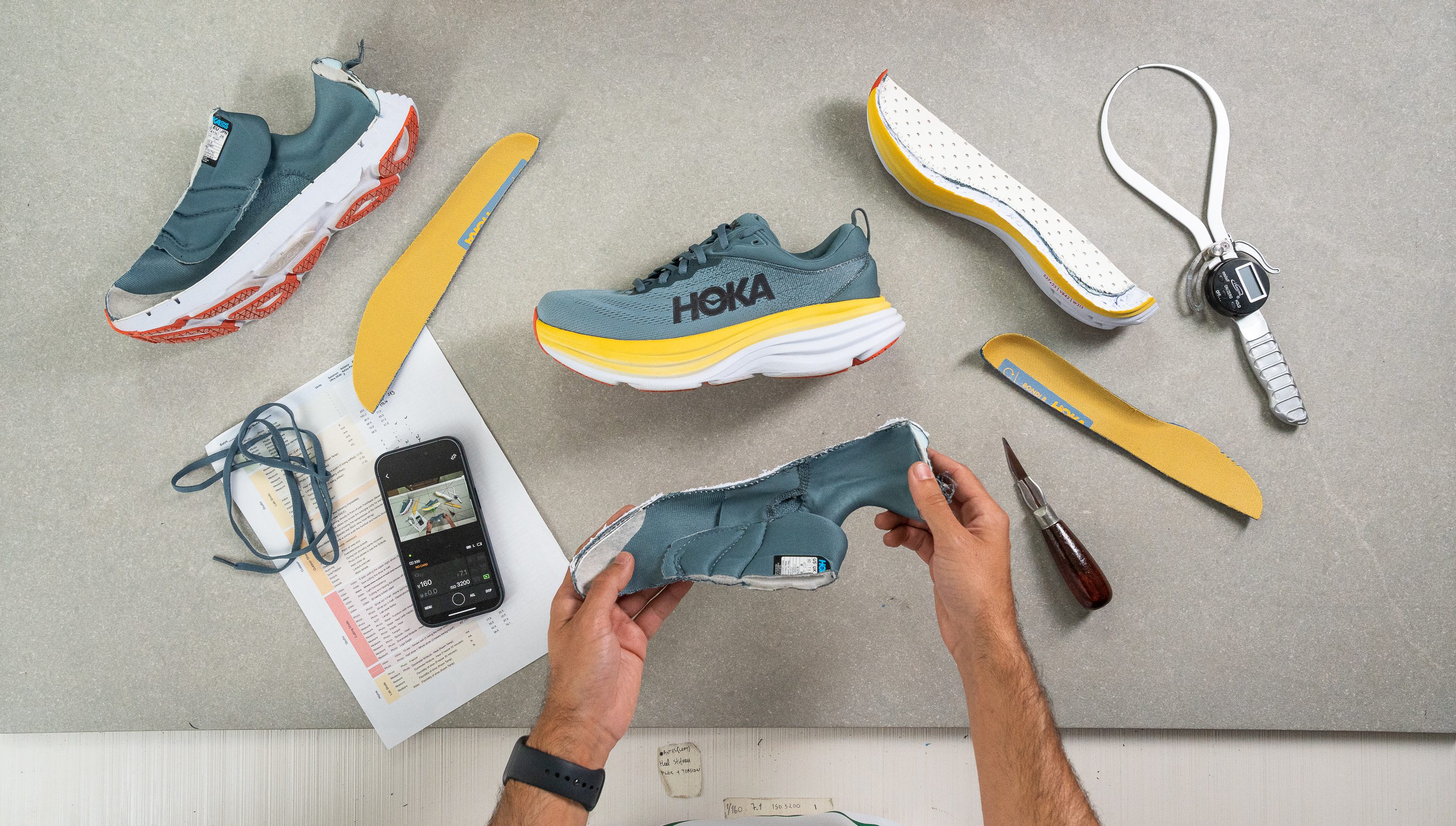
Cushioning
Shock absorption
Thanks to our test, we found that the Bondi 8 provides good cushioning in the forefoot. However, the heel doesn’t quite match the shoe’s oversized look. It measured 125 SA in the rear, which aligns more with an average daily trainer, while the forefoot reached a protective 118 SA.
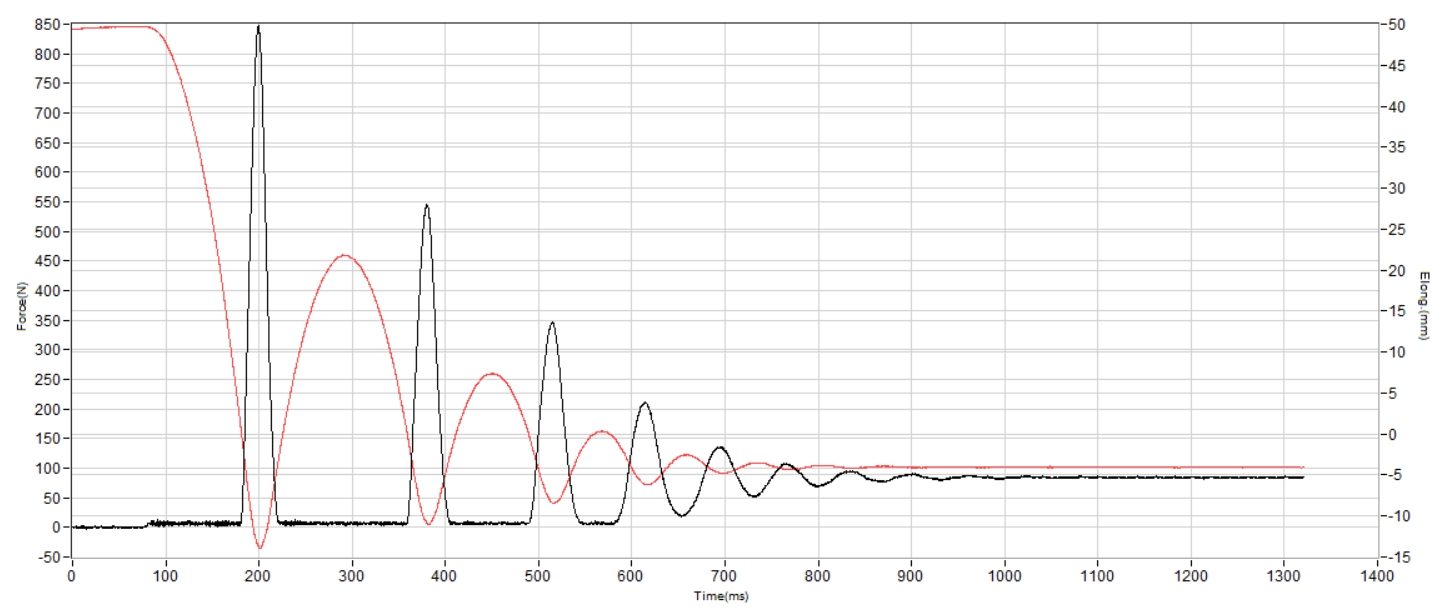
| Hoka Bondi 8 | 125 SA |
| Average | 130 SA |
Energy return
Those hoping for a bouncy ride in the Bondi 8 should manage expectations, as it delivers quite the opposite. With just 51% energy return, it offers minimal rebound and trails behind most running shoes in our comparison chart. Then again, it’s no surprise given the use of a basic EVA foam.
| Hoka Bondi 8 | 51.0% |
| Average | 58.6% |
Heel stack
The added cushioning foam on the Bondi 8 makes it look unscrupulously comfortable!
And how does this feel on the run? Ooooh la! Meaning to say, it's 11/10 comfortable. There’s no disguising that this shoe is incredibly cushioned.
While stack height does not 1-1 correspond to more cushioning, there's usually a connection between the two. Based on our caliper measurements, the Bondi 8 has a massive stack height of 36.2 mm (3 mm thicker than the average).
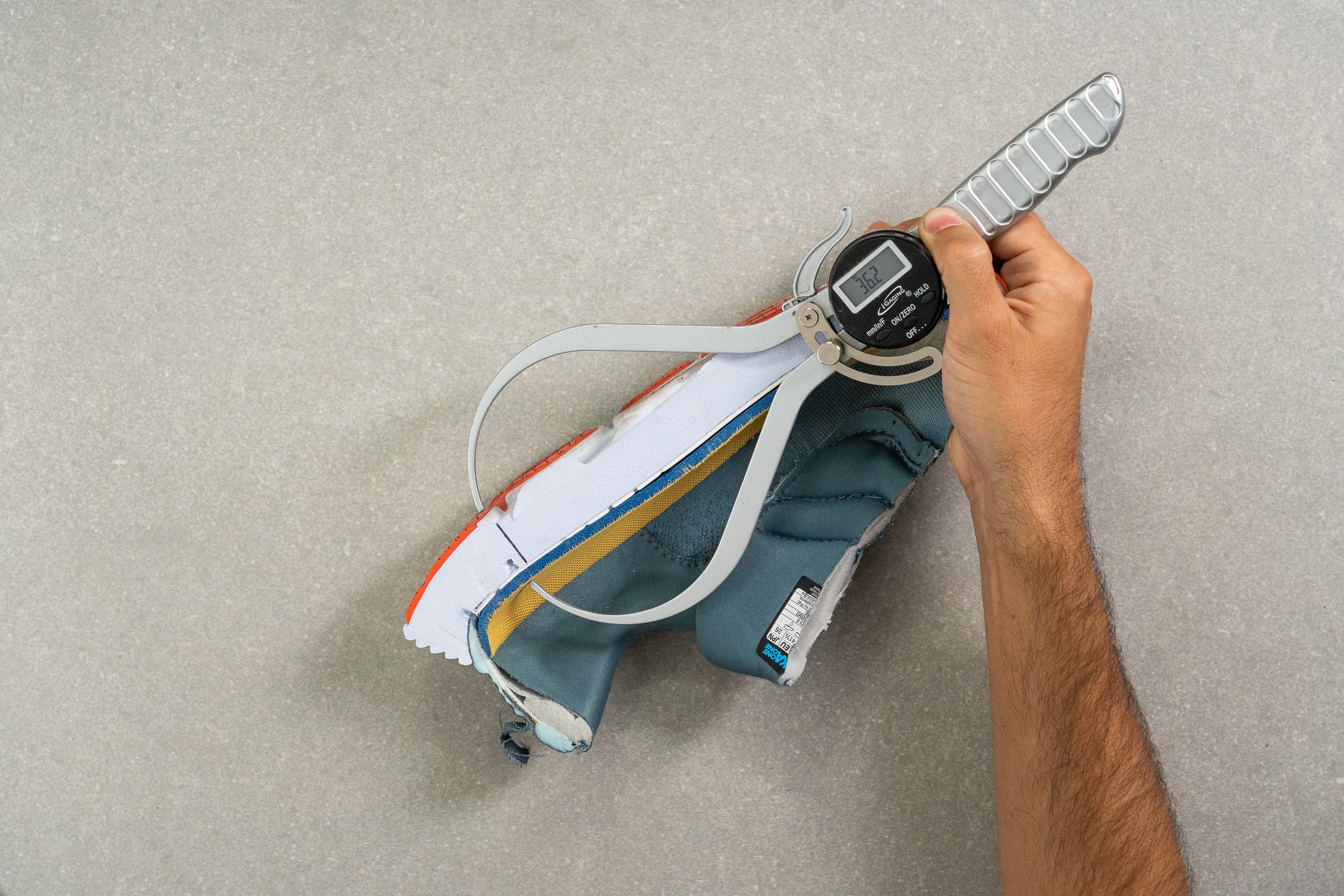
That's a significant departure from the previous Bondi 7 which came in at 33 mm in the heel.
| Hoka Bondi 8 | 36.2 mm |
| Average | 34.8 mm |
Forefoot stack
Things get even beefier in the forefoot as our caliper shows 30 mm of stack.
Wow! That's 4.5 mm thicker than road shoes on average! Only 10% of shoes in our lab exceeded the 30 mm mark in the forefoot.
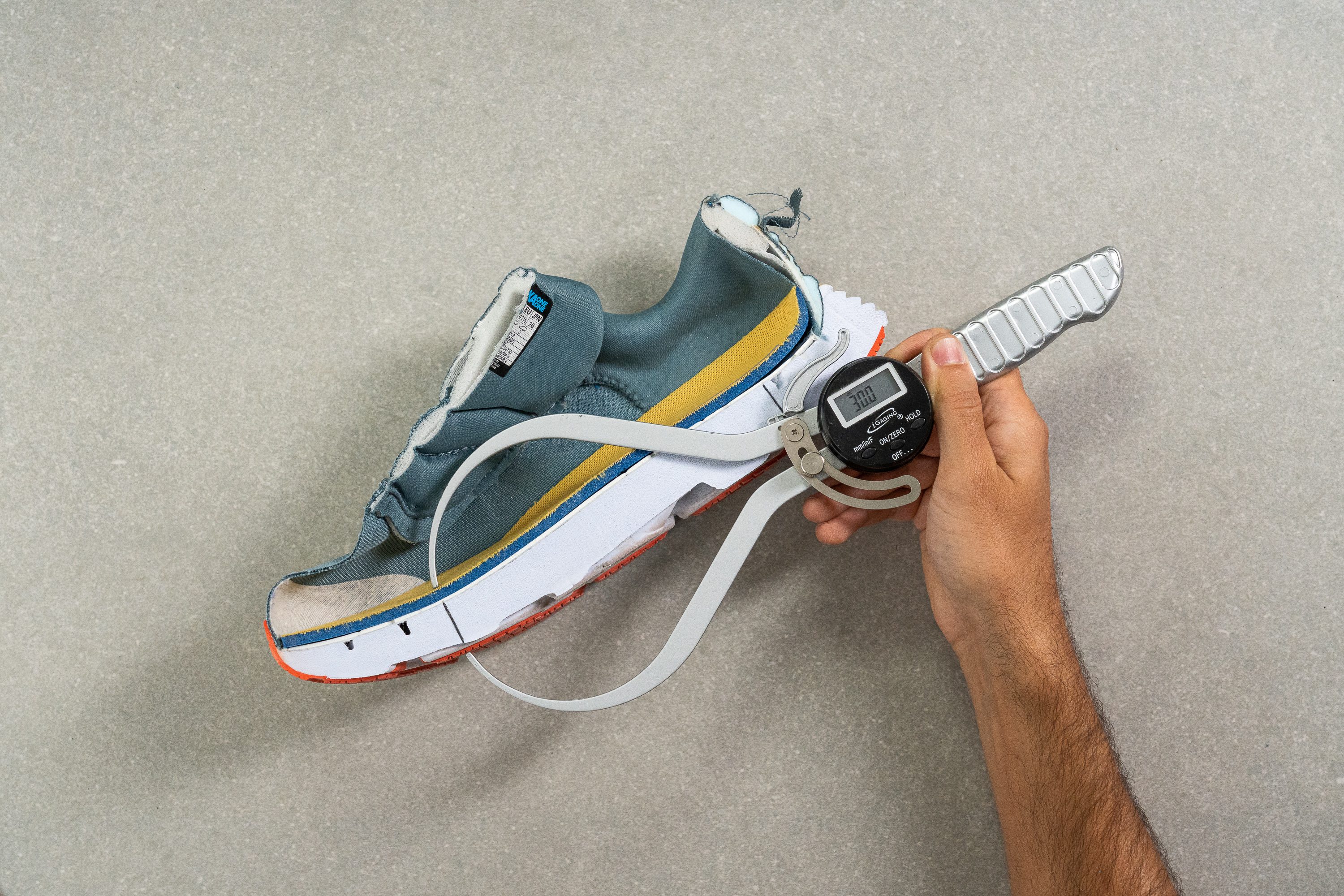
| Hoka Bondi 8 | 30.0 mm |
| Average | 26.2 mm |
Drop
However, we were disappointed to find a discrepancy between the shoe's actual heel-to-toe drop and the ones stated by the brand.
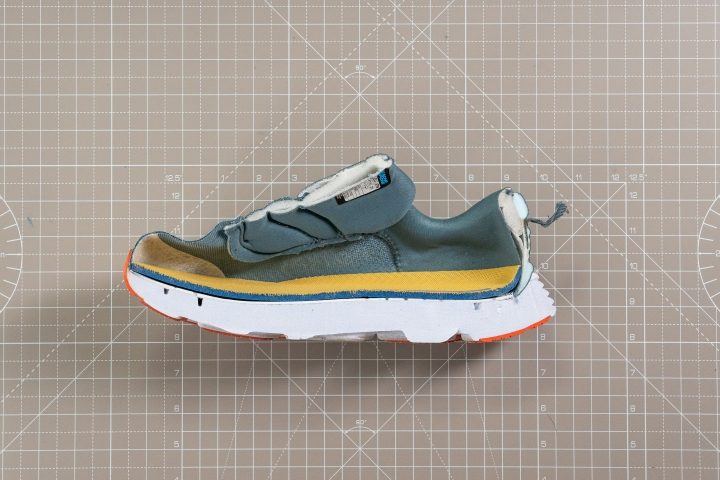
Based on our own stack measurements, the drop comes at 6.2 mm. That's 2.2 mm taller than what Hoka claims - 4 mm.
This may not be a big deal to the majority of runners but those who specifically look for low drop should be warned.
| Hoka Bondi 8 | 6.2 mm |
| Average | 8.6 mm |
Midsole softness
UpdatedThe Bondi 8 is not exceptionally springy or built for tempo efforts. However, it provides enough bounce to keep the ride enjoyable while delivering substantial cushioning underfoot.
We found that the EVA foam in the Bondi 8 leans slightly toward the firm side. With a durometer reading of 41.5 AC, it does not deliver the ultra-plush sensation that some runners might anticipate.
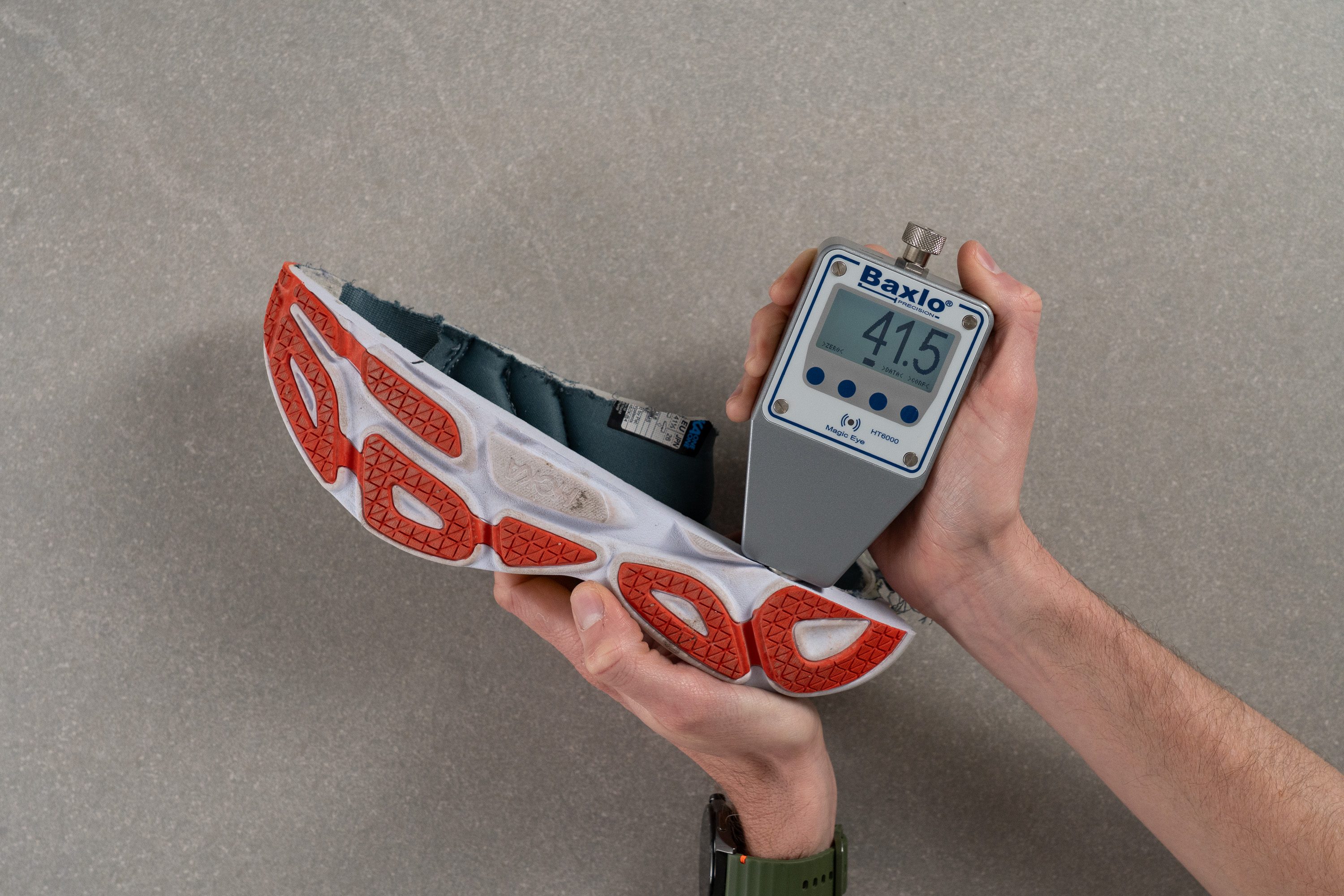
| Hoka Bondi 8 | 41.5 AC |
| Average | 36.3 AC |
Rocker
We found that the shoe's rocker geometry performs very effectively. It makes the strides feel effortless in the Bondi 8.
We think that its seamless and easy-rolling ride is the shoe's biggest selling point after cushioning.
Size and fit
Size
Hoka Bondi 8 fits true to size (2203 votes).
Width / Fit
We felt a good deal of tightness in the Hoka Bondi 8.
To investigate further, we created a gel mold of the shoe's interiors and, using a pair of calipers, confirmed that the shoe is unexpectedly narrow on paper. At its widest point, the gel mold measured 92.2 mm—significantly narrower than average.
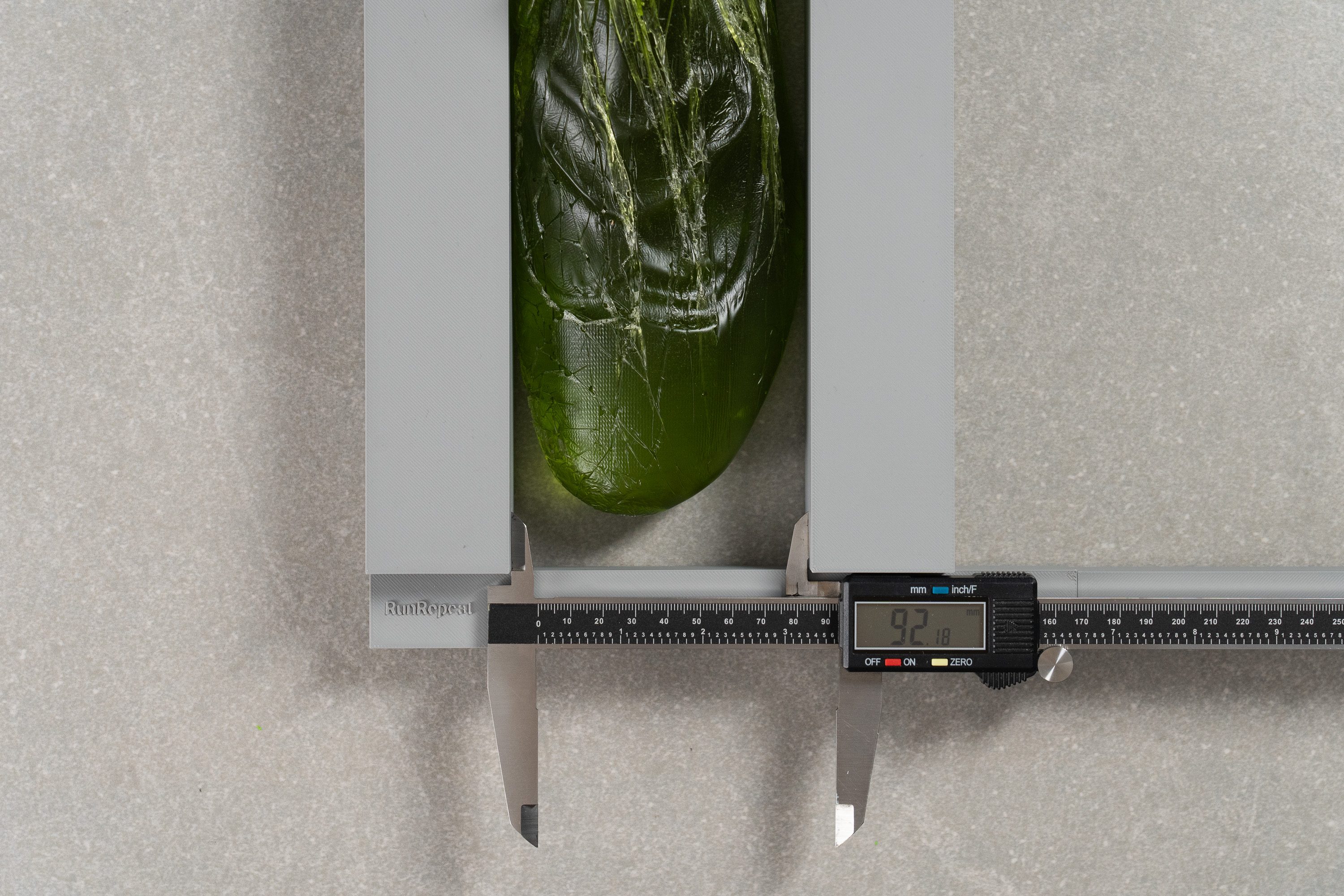
| Hoka Bondi 8 | 92.2 mm |
| Average | 95.2 mm |
Toebox width
We think this will be a problem even for medium-sized feet like ours, especially because the Bondi 8 tapers significantly. Our measurement in the toebox area showed only 69.2 mm, making it one of the few shoes in the lab to go under 70.0 mm in this test.
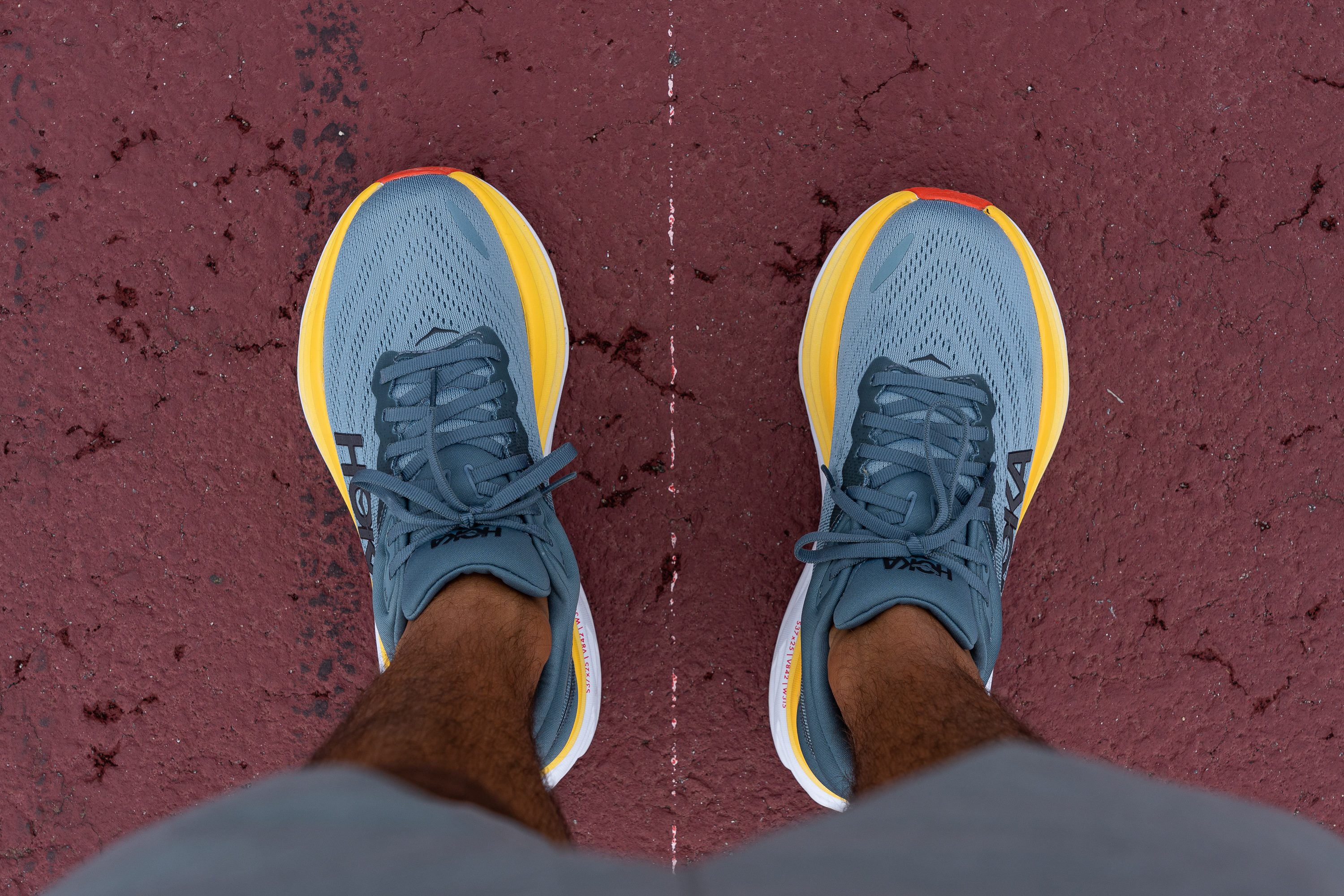
For that reason, we recommend going half a size up in this Hoka shoe or opting for the wide and extra-wide options available for it.
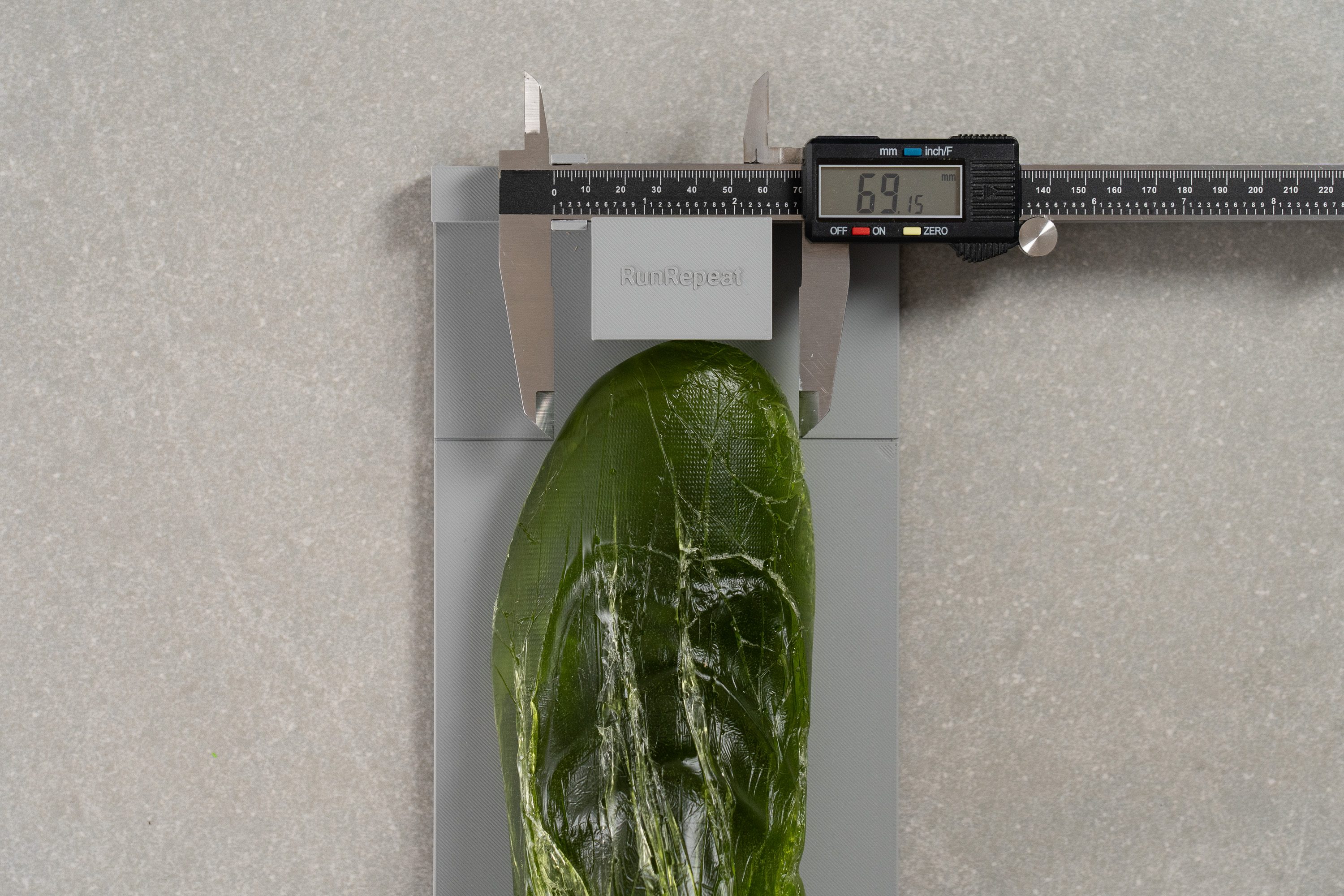
| Hoka Bondi 8 | 69.2 mm |
| Average | 73.3 mm |
Toebox height
After our third measurement of 28.5 mm, the Bondi 8 offered better news for runners with high-volume feet—providing a comfortable amount of vertical space.
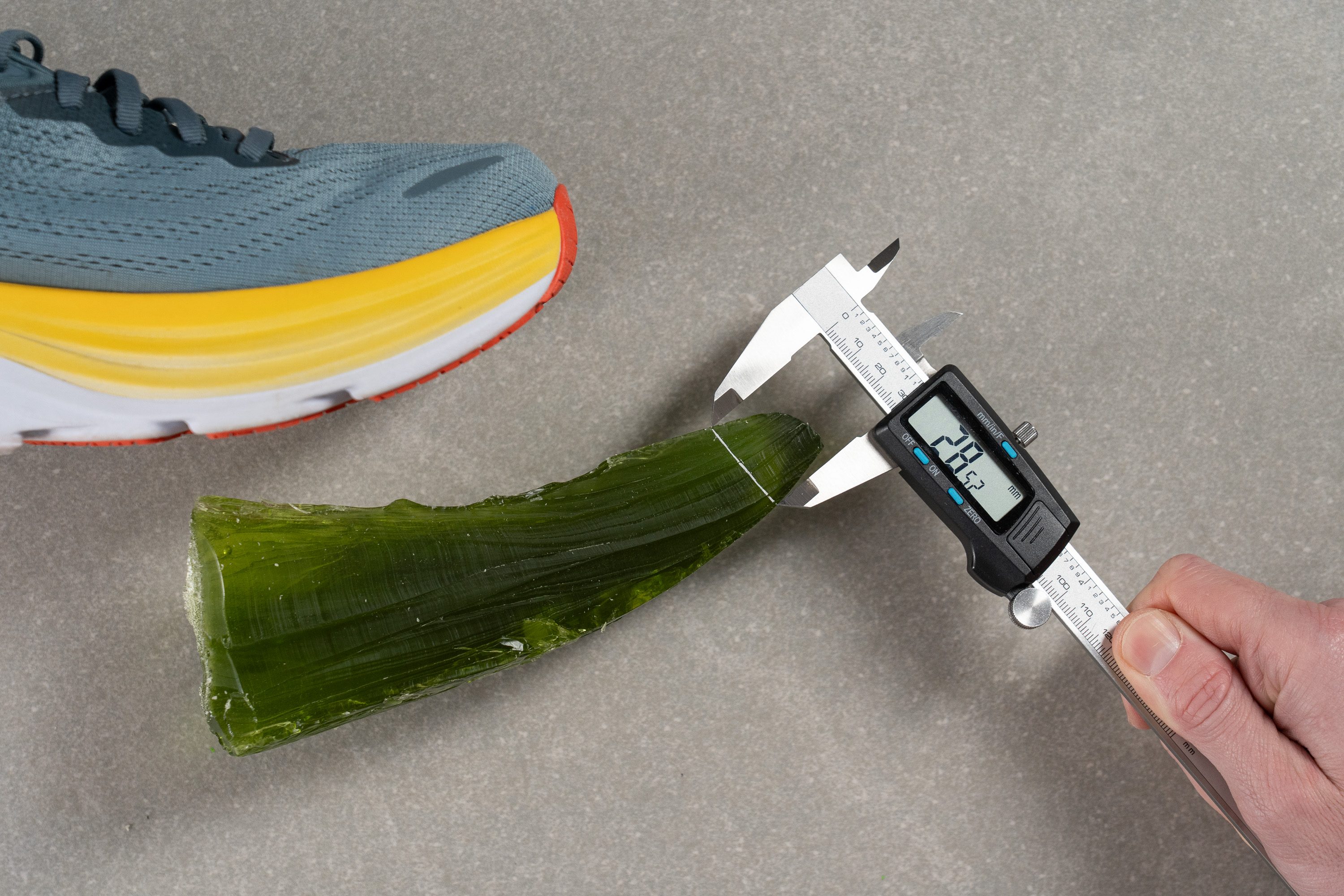
| Hoka Bondi 8 | 28.5 mm |
| Average | 27.1 mm |
Flexibility / Stiffness
The Bondi 8 surprised us. Despite being a maximalist running shoe, it showed surprisingly decent longitudinal flexibility.
We found it only required 17.7N in our machine, which lands right around the average range!
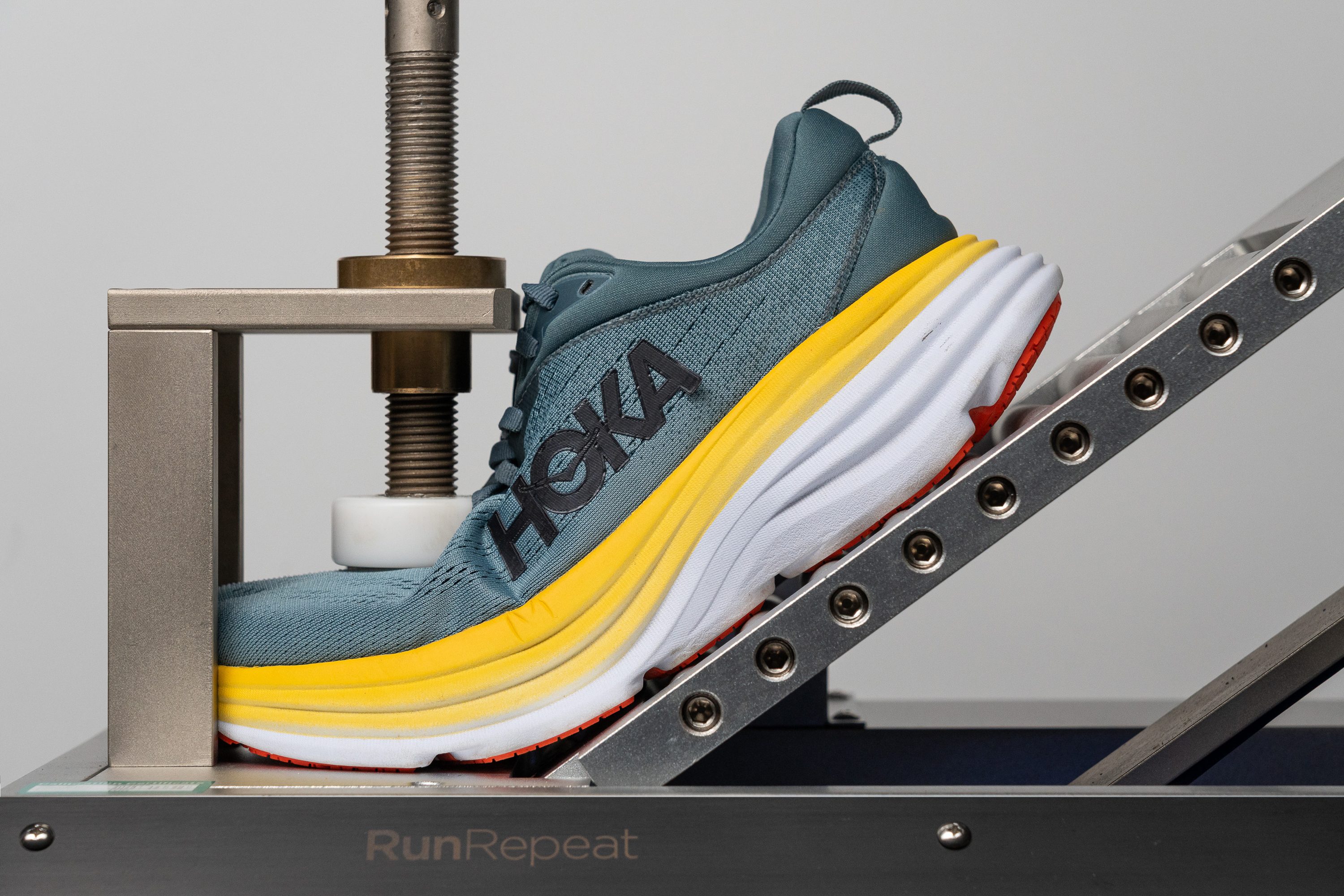
| Hoka Bondi 8 | 17.7N |
| Average | 15.3N |
Weight
The Hoka Bondi 8 gets a weight penalty because, at 11 oz (311g), it is way heavier than most daily running shoes by almost an ounce.
But on a lighter note, it doesn't feel like the shoe drags the foot down.
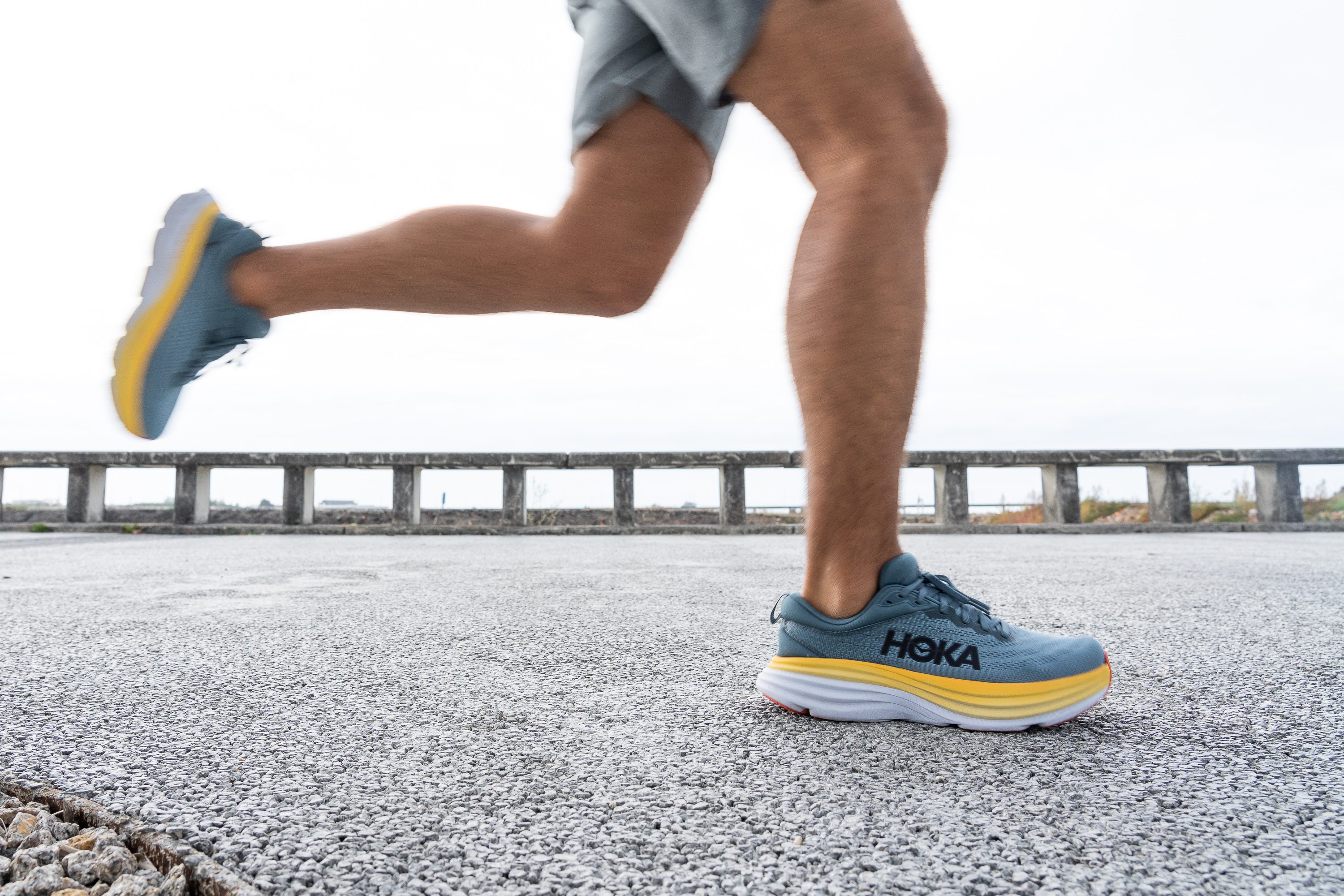
| Hoka Bondi 8 | 11.0 oz (311g) |
| Average | 9.3 oz (264g) |
Breathability
With all the in-shoe padding on the Bondi 8, breathability is still not compromised. It may not be the best choice for warm weather but it definitely has enough airflow for moderate climates.On a 1-5 scale, we rated its breathability as 3.
The most breathable areas can be seen in our transparency test below.
| Hoka Bondi 8 | 3 |
| Average | 3.7 |
Stability
Lateral stability test
What's great about the Bondi 8 is that it's soft, but it's not too soft. Despite its high-stack design, the shoe never made us feel tippy.
Torsional rigidity
There is a solid amount of torsional rigidity to prevent the Bondi 8 from twisting easily.
In our manual flexibility test, we rated this Hoka shoe's torsional stiffness as 4 out of 5. That's pretty high up on a 1-5 scale where 5 is the stiffest!
That lowers the risk of rolling the ankle considerably.
| Hoka Bondi 8 | 4 |
| Average | 3.5 |
Heel counter stiffness
Contributing to a sense of stability is the Bondi 8's moderately stiff heel counter. In a manual assessment, we gave it 3 out of 5 (where 5 is the stiffest).
The shoe's generous collar padding also adds a great deal of ankle security to this Hoka shoe.
| Hoka Bondi 8 | 3 |
| Average | 2.9 |
Midsole width - forefoot
If you thought that the Hoka Clifton was a monster, you've got to check out the Bondi!
Based on both the look of it and the measurements, the Bondi 8 makes one of the largest platforms in our lab! And probably in the history of running shoes too.
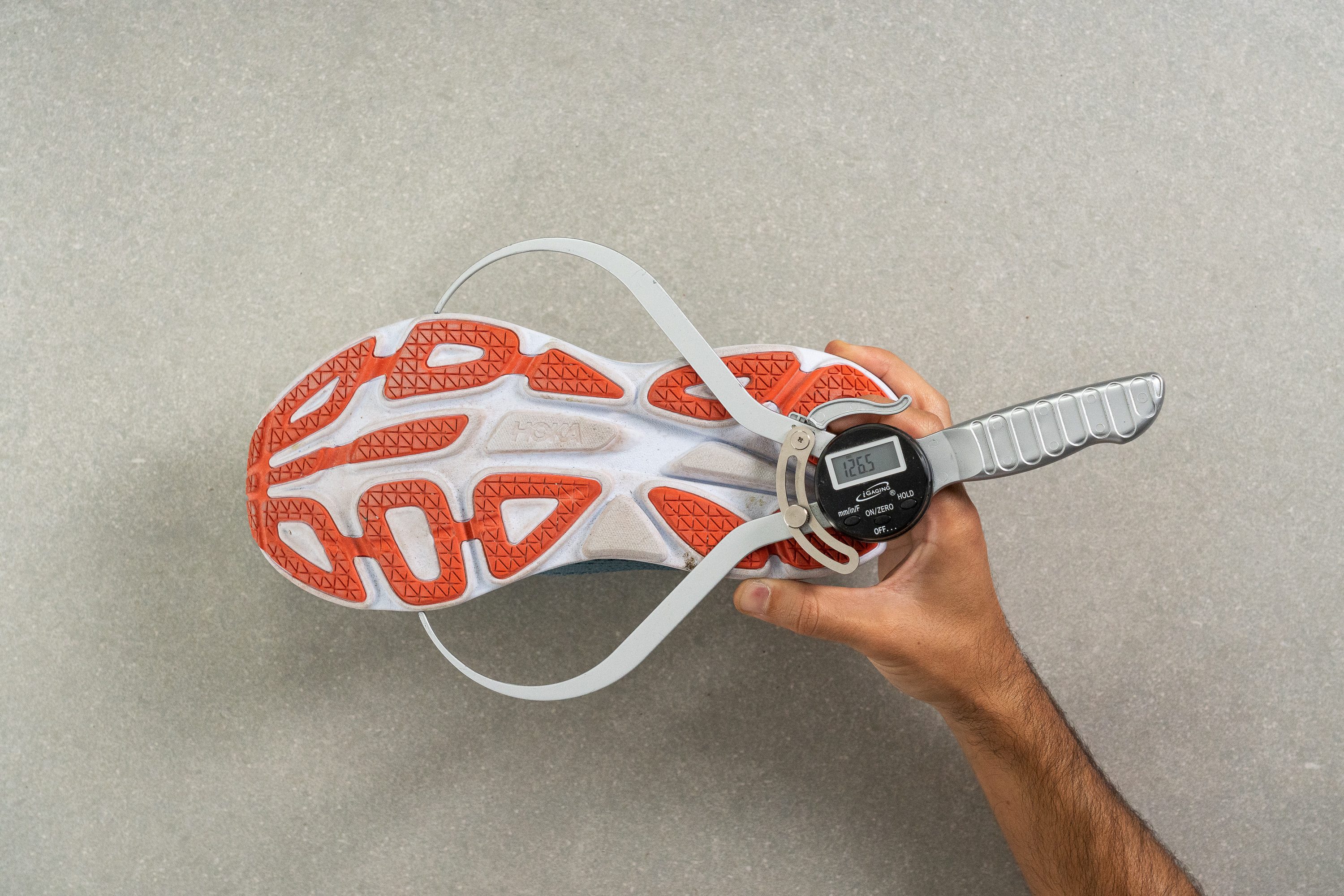
In the widest part of the forefoot, our caliper shows a whopping 126.5 mm. THat's over 13 mm wider than the average road shoe! Insane!
| Hoka Bondi 8 | 126.5 mm |
| Average | 114.4 mm |
Midsole width - heel
The shoe continues to impress us in its heel section too! Our caliper shows 100.9 mm in the widest part which, yet again, exceeds the average. This time by 11 mm.
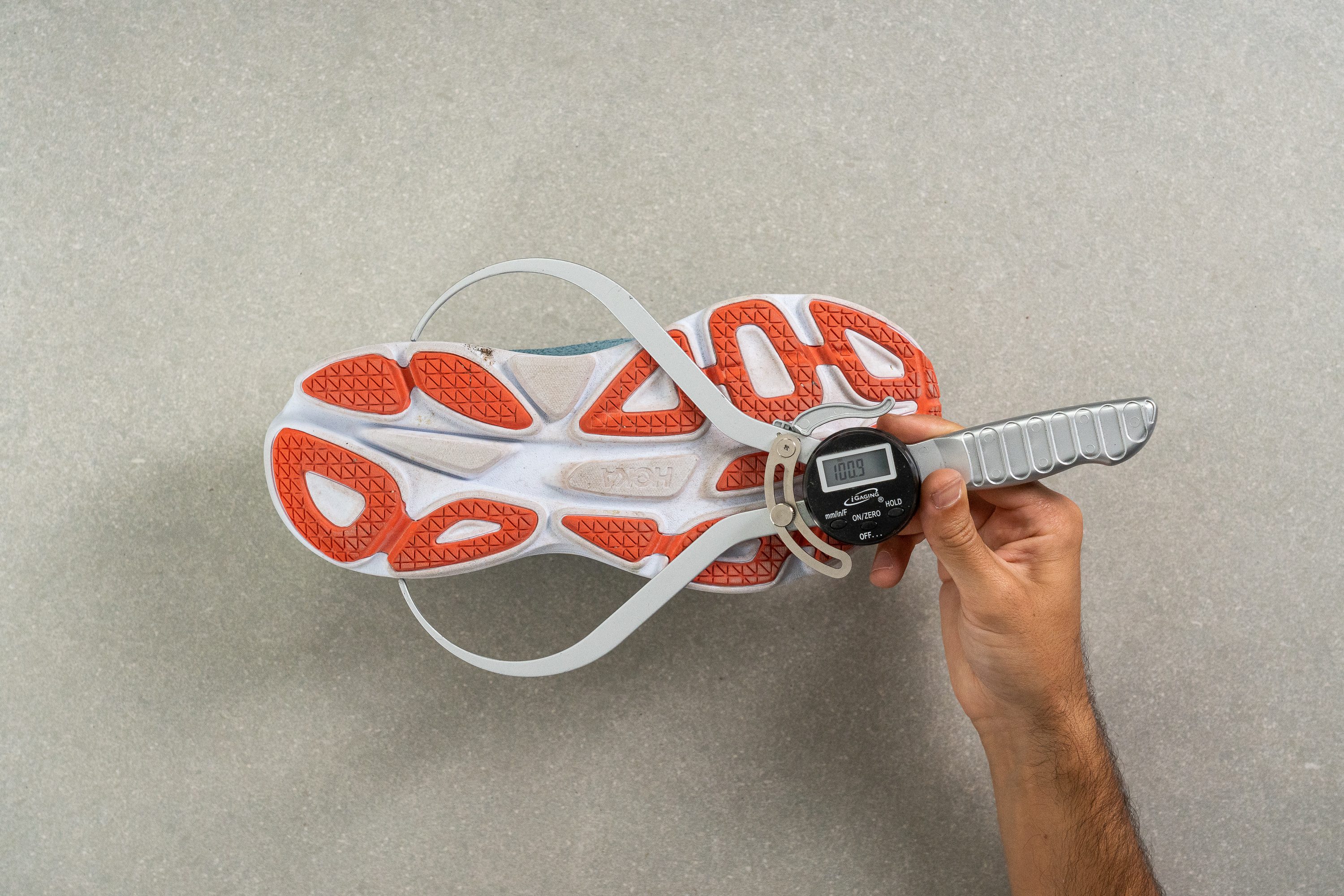
Having such a wide landing area, no wonder we felt so stable in the Hoka Bondi 8!
| Hoka Bondi 8 | 100.9 mm |
| Average | 90.6 mm |
Durability
Outsole hardness
The fact that the Bondi 8 has softer rubber and lots of exposed foam made us a little concerned.
Using our durometer, we measured the shoe's outsole hardness at 74.0 HC. That's 8% softer than the average of road shoes.
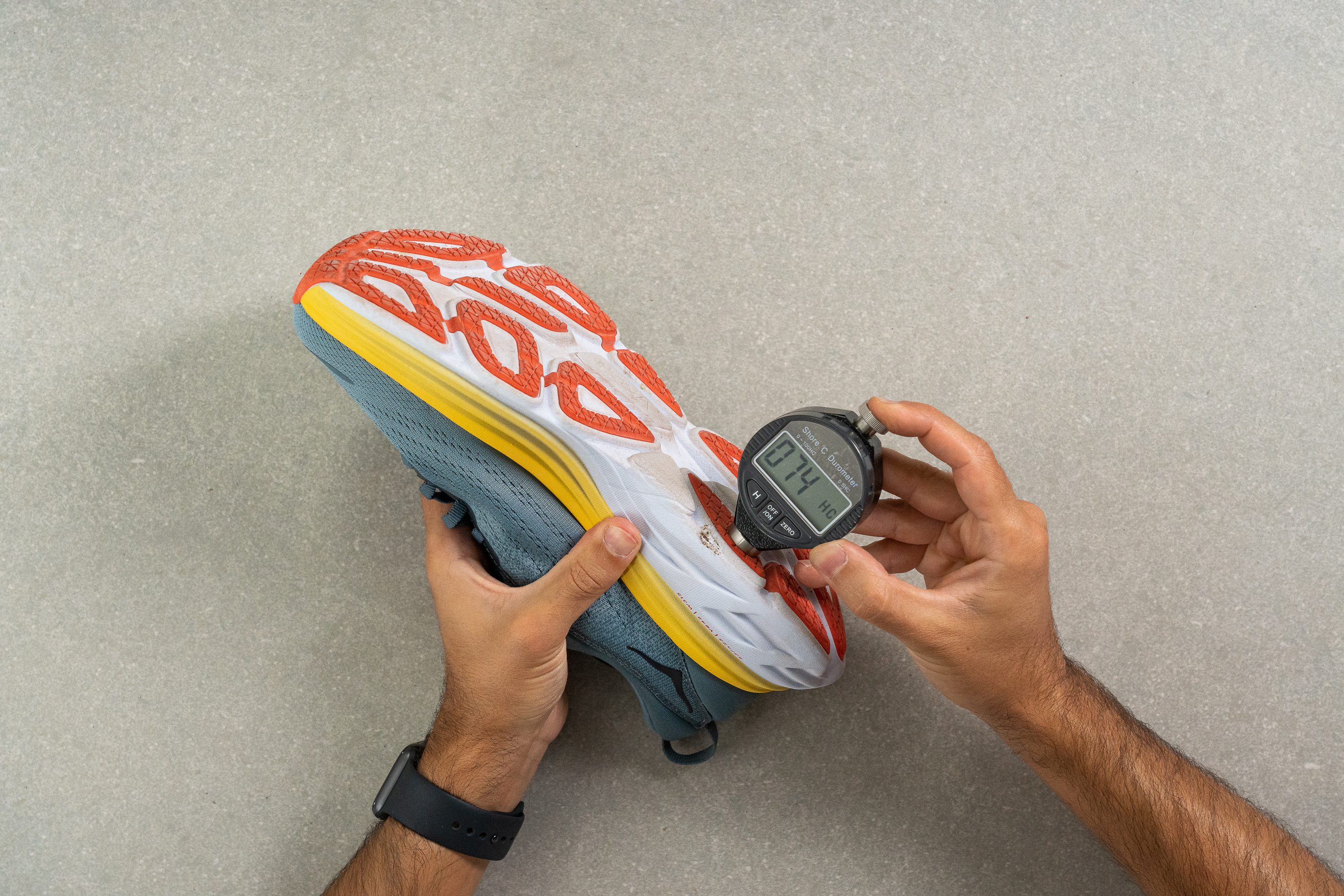
But on the actual run test, we were quite relieved to find that the rubber held up pretty well! In fact, its soft nature really helped to soften the landings.
| Hoka Bondi 8 | 74.0 HC |
| Average | 79.2 HC |
Outsole thickness
Despite not having a full-length outsole, we found the Hoka Bondi 8 to be fairly durable. It is not as wear-resistant as most road shoes due to its exposed foam but we believe that it will hold up for at least 300 miles.
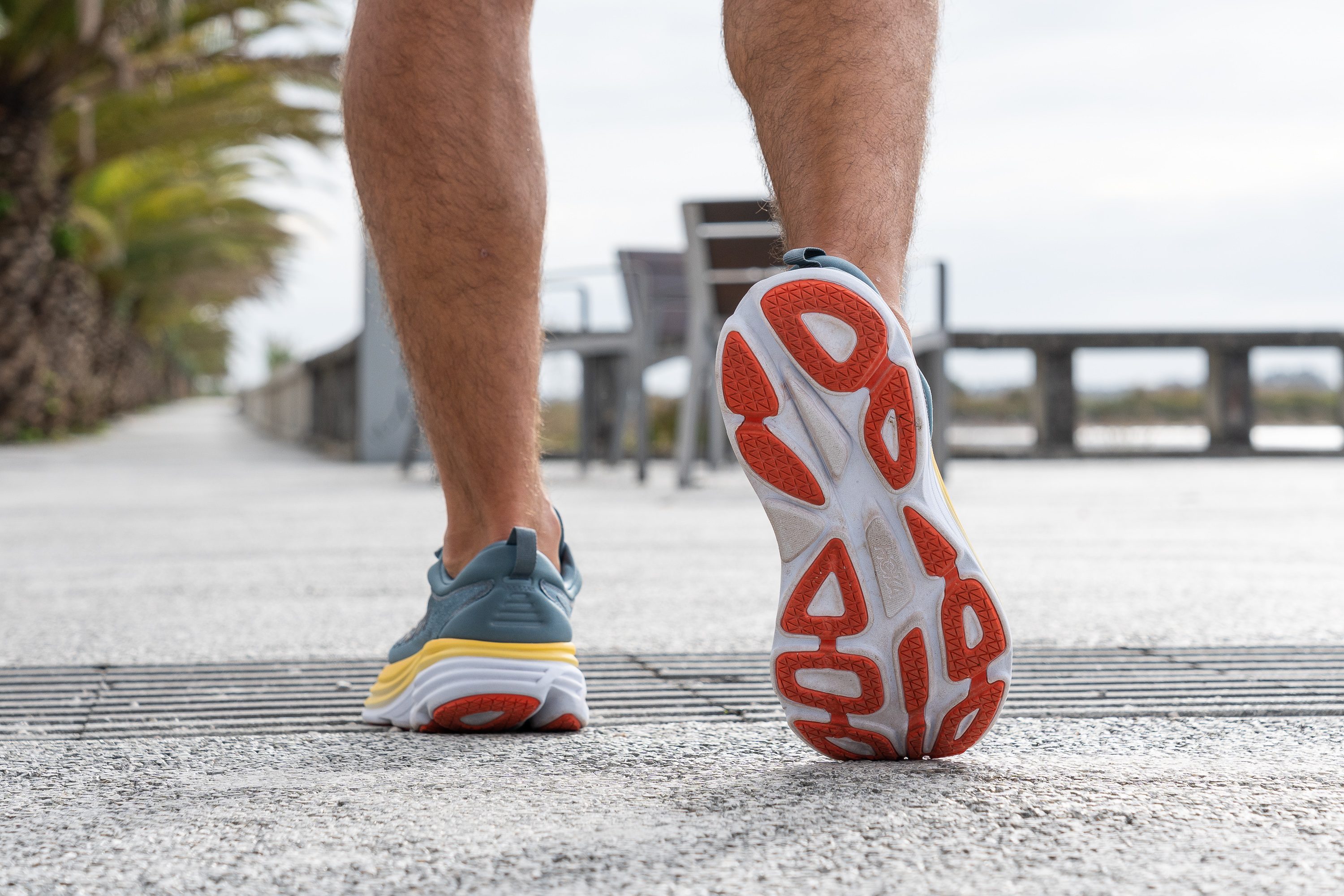
The good news is that the rubber pieces at the bottom of the shoe are 3 mm thick. This is the same amount of rubber as road running shoes have on average.
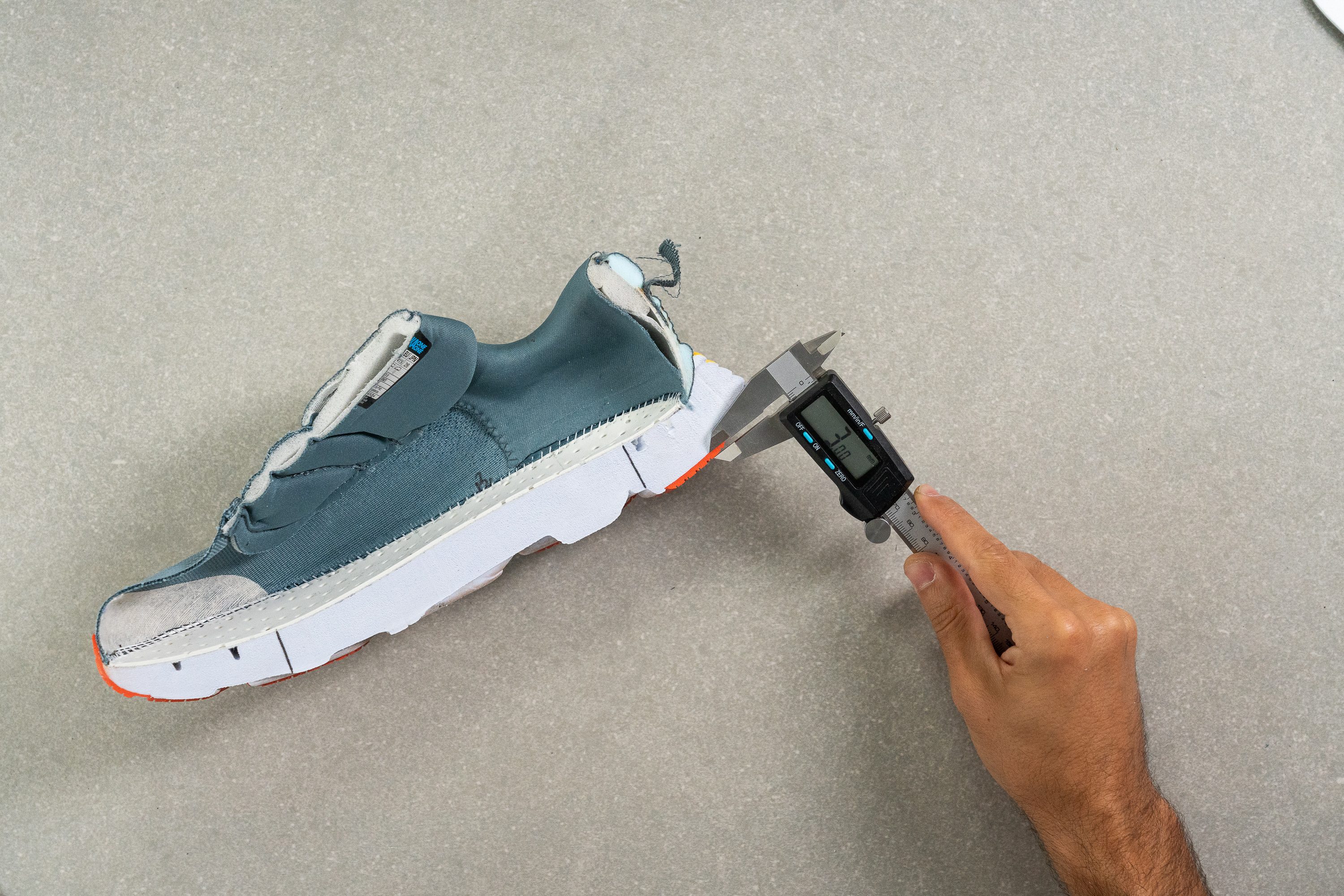
| Hoka Bondi 8 | 3.0 mm |
| Average | 3.2 mm |
Misc
Insole thickness
Measuring the shoe's insole thickness, we got 4.9 mm. This is a little more generously padded than the average, adding up to the Bondi 8's heavenly underfoot feel.
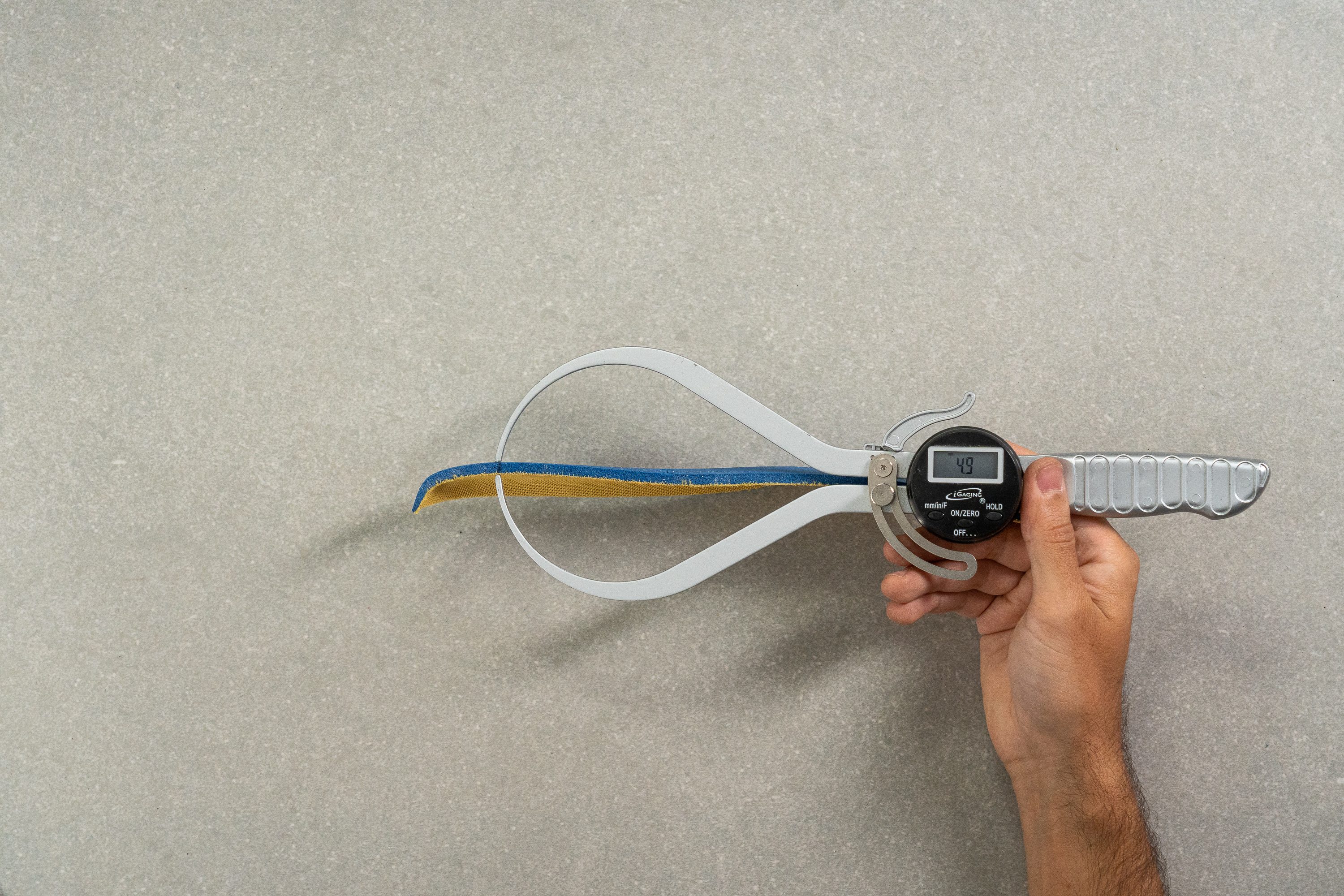
| Hoka Bondi 8 | 4.9 mm |
| Average | 4.5 mm |
Midsole softness in cold (%)
We also checked how much firmer the Bondi 8 would get after spending 20 minutes in the freezer.
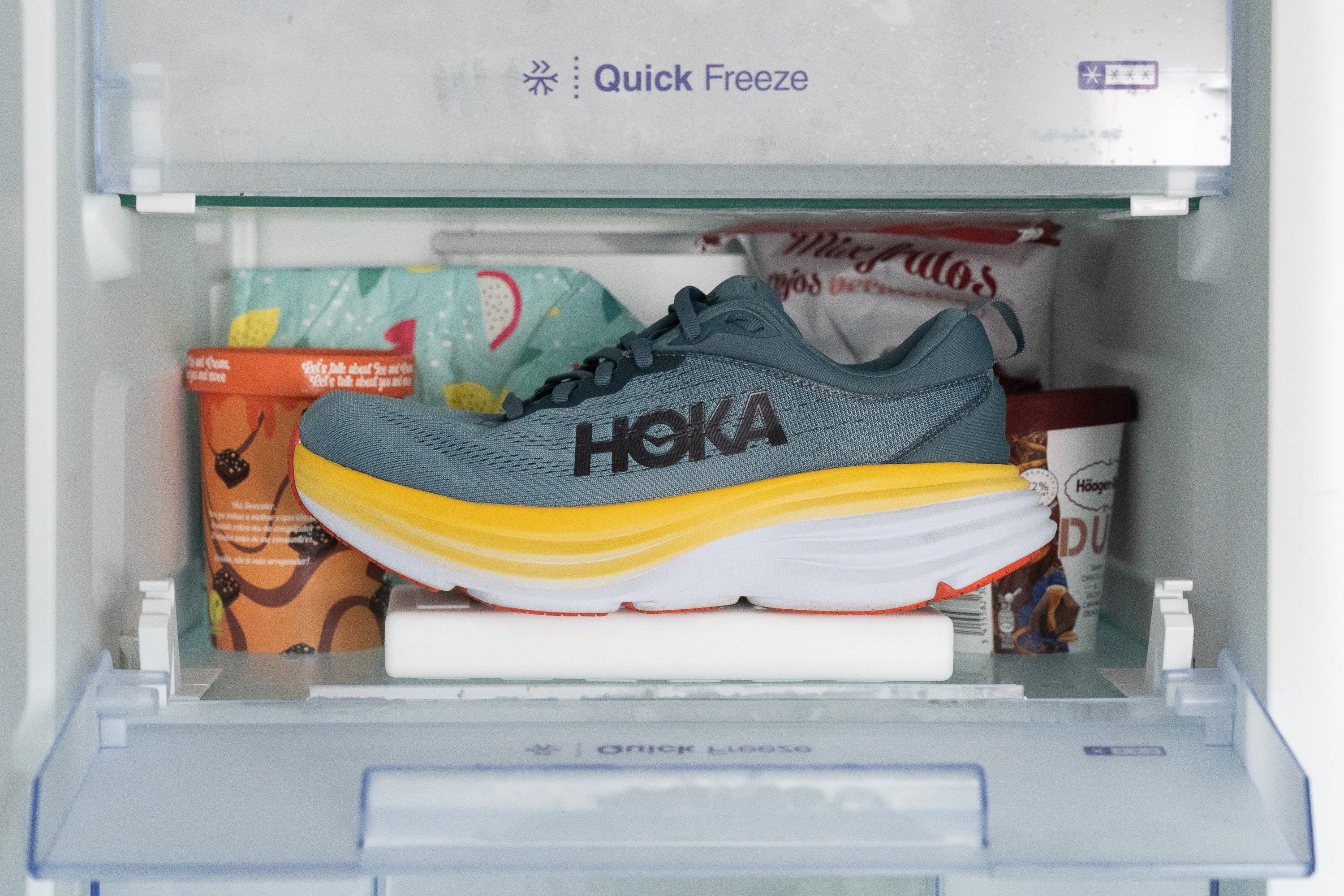
The foam got 49% harder but still ended up softer than most running shoes at room temperature. So, we are happy to say that this Hoka shoe won't be turning into an ice cube under the cold breath of winter.
| Hoka Bondi 8 | 49% |
| Average | 24% |
Tongue padding
Much like its midsole, the tongue also had to be extra thick on this Hoka Bondi shoe.
With a caliper reading of 9 mm, it is 3.2 mm thicker than the average! Lace bites are unheard of in this Hoka shoe.
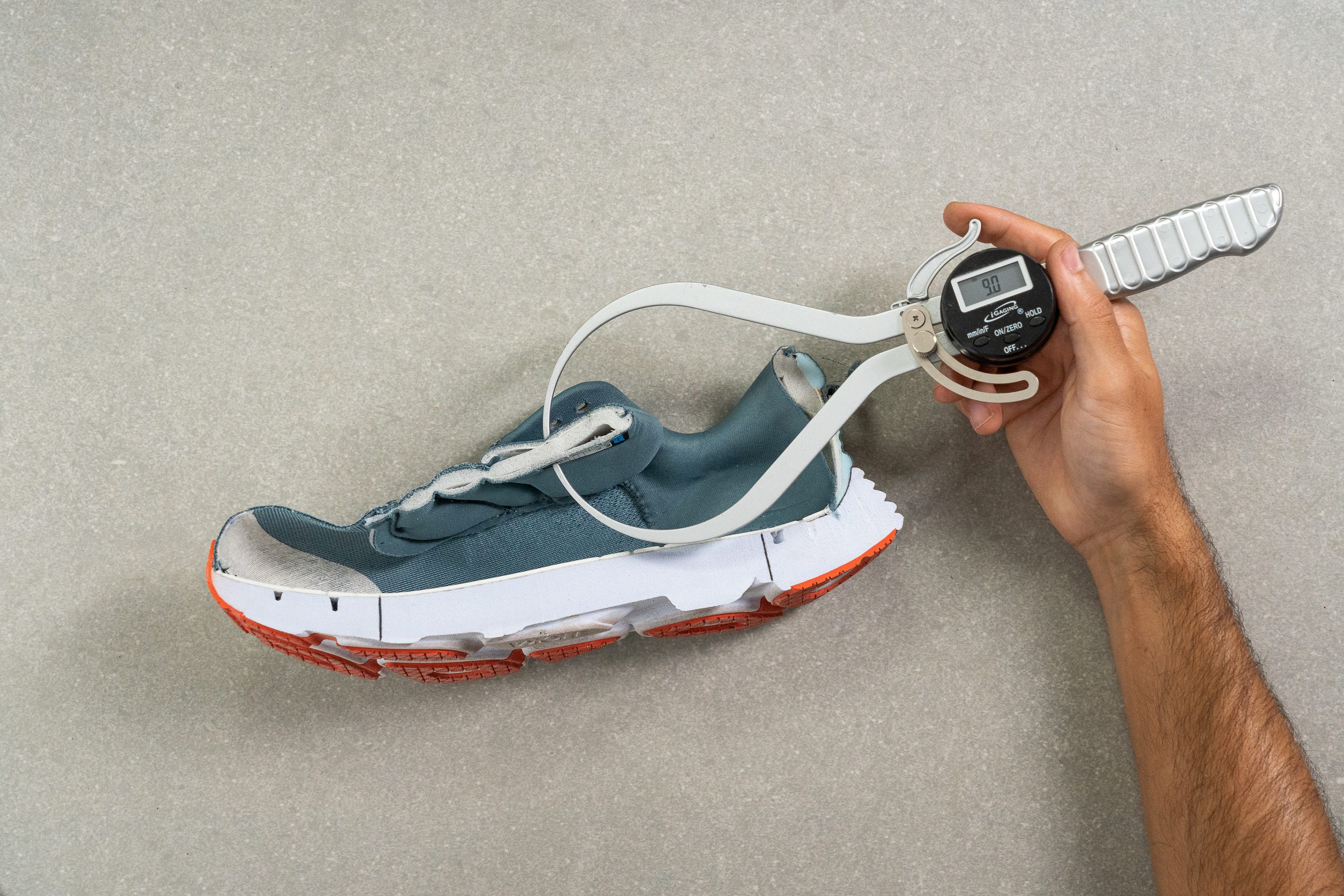
| Hoka Bondi 8 | 9.0 mm |
| Average | 5.7 mm |
Tongue: gusset type
The tongue behaves!
The shoe's tongue is partially attached to the sides a.k.a semi-gusseted. We experienced zero shifting and the tongue did its job of locking the foot down in place.

| Hoka Bondi 8 | Both sides (semi) |

